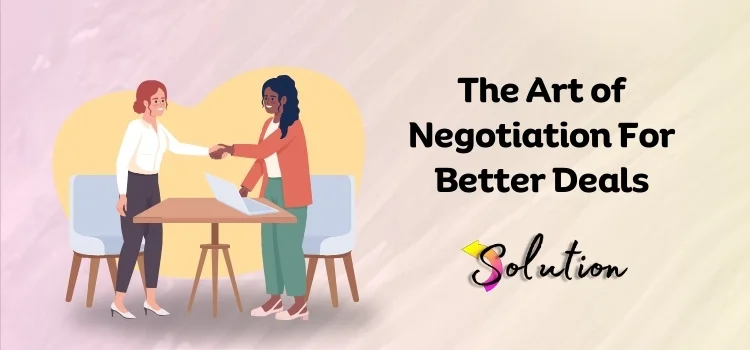
Negotiation, a skill that transcends boundaries and is universally applicable, is the art of reaching a mutually beneficial agreement through communication and compromise. It’s not just about haggling over prices in a marketplace or closing multi-million-dollar business deals. Negotiating effectively is a life skill that can lead to personal and professional success, making it a skill we all can relate to and benefit from.
Understanding the goals and interests of each party involved and having effective communication skills are essential to mastering the art of negotiation, which is- key to personal growth and success. By improving these abilities, you can resolve conflicts skillfully in personal and professional contexts, forge stronger bonds with others, and produce better results, enhancing your personal and professional life.
This blog will discuss the negotiation theory and provide practical information and useful insights you can immediately apply to your life. We aim to empower you to become a more successful negotiator in various aspects of your life, equipping you with the tools and knowledge you need to negotiate effectively.
The Importance of Negotiation
A mutually beneficial agreement is the goal of communication between two or more parties during a negotiation. It is a cornerstone of human contact that supports commercial dealings, diplomatic missions, and interpersonal relationships. Understanding the importance of negotiation can help you improve your communication skills and achieve favorable outcomes in various situations.
Effective negotiating skills can lead to the following outcomes.
- Better Relationships: Building mutual respect and understanding through effective negotiation strengthens bonds between individuals on a personal and professional level.
- Better Deals: When negotiating a wage, a contract, or regular transactions, a skilled negotiator can get favorable conditions.
- Conflict Resolution: Amicable resolution of disagreements requires negotiation.
- Improved Problem-Solving: Negotiation fosters creative problem-solving and thinking, leading to original solutions.
Read Also :-Top 7 Hollywood Movies
The Key Principles for Effective Negotiation
To become an expert negotiator, one must comprehend and put some fundamental ideas into practice.
1. Preparation
Effective negotiating starts with preparation. It entails organizing your strategy, understanding the situation, and gathering facts. The following are crucial preparatory actions to consider:
- Research: Compile pertinent information regarding the topic of discussion, such as pricing, market trends, and the other party’s interests.
- Establish Objectives: Express your aims and goals clearly. Be clear about your goals and the compromises you are willing to make.
- Recognize the Opponent: Learn about the other side’s objectives, passions, and limitations. This will allow you to anticipate their wants and reactions better.
- Formulate a Plan: Create a negotiation plan that includes the compromises you will make, your starting offer, and any other options.
2. Communication
In negotiations, effective communication is essential. It entails attentively listening to the other person and effectively stating your thoughts. Critical communication skills include the following:
- Active Listening: Pay close attention to what the other person says to show that you comprehend their point of view. This fosters rapport and trust.
- Precision and Clarity: When communicating, use clarity and precision. Ensure that your viewpoints are understood and avoid any ambiguity.
- Nonverbal Cues: Be mindful of nonverbal cues such as facial expressions, tone of speech, and body language. These signs might offer insight into the other person’s thoughts and intentions.
3. Emotional Intelligence
In negotiations, emotional intelligence (EQ) is very important. It entails utilizing awareness of your and other people’s emotions to direct your relationships. The following are key facts about emotional intelligence:
- Self-awareness: Be conscious of your feelings and how they affect your actions. Remain composed and calm even in trying circumstances.
- Empathy: recognize and value the other person’s feelings and viewpoints. This facilitates rapport-building and the discovery of common ground.
- Self-Regulation: Effectively control your emotions. Refrain from rash decisions and maintain your focus on your objectives.
4. Establishing Connections
In addition to securing a quick agreement, negotiation aims to forge lasting bonds among parties. Building a positive rapport can help future negotiations turn out better. Important tactics consist of:
- Building Trust: Be truthful, dependable, and willing to build trust. Trust is the foundation of any successful negotiation.
- Finding Common Ground: Determine shared values and interests. This fosters a spirit of cooperation and teamwork.
- Win-win techniques: Strive to find solutions that satisfy everyone. This ensures that everyone is pleased with the result.
5. Adaptability and Flexibility
During negotiations, unforeseen events frequently occur. It is essential to be adaptive and agile when handling these changes. Important tactics consist of:
- Creative Problem-Solving: Remain receptive to fresh concepts and approaches. Find innovative solutions that will benefit both parties.
- Flexibility: Modify your tactics and approach according to the negotiation’s circumstances. Be prepared to change courses as required.
- Be patient: Negotiating can take a while. Remain calm, and don’t jump to conclusions.
Strategies and Techniques for Negotiations
In addition to the fundamental ideas, the following particular approaches and techniques can improve your negotiating abilities:
1. BATNA (Best Alternative to a Negotiated Agreement)
Knowing your best alternative is essential in negotiations. Even if the negotiation is unsuccessful, it is the best result you can get. Because it establishes a baseline for what you are willing to tolerate, knowing your BATNA provides you with leverage and confidence.
2. Anchoring
Anchoring is establishing the initial terms or offers in a negotiation. The opening offer might greatly influence the negotiation’s course. Make sure your anchor aligns with your interests while remaining realistic.
3. Framing
We refer to the presentation of information as framing. Depending on the presentation, the same offer can take different directions. While negative framing draws attention to the dangers or disadvantages of failing to reach a consensus, positive framing stresses the advantages.
4. Mutual Understanding
Giving something valuable to someone else with the hope that they will do the same is known as the reciprocity principle. This may instil a sense of duty and lead to compromises.
5. The Power of Silence
In negotiations, silence can be a very useful tactic. The other side is under pressure to fill the void, which frequently results in their making compromises or disclosing important information.
6. Handling Due Dates
Deadlines can accelerate the negotiation process and create urgency. But beware of the fictitious deadlines the opposing party sets to get you to make a decision right now. Make strategic use of deadlines to your advantage.
Conclusion
Negotiating is a complex skill that involves several elements, including planning, communicating, developing relationships, emotional intelligence, and adaptability. If you can grasp these components, you can successfully negotiate and reach agreements in both personal and professional contexts.
Recall that negotiation aims to discover advantageous solutions for all sides, not just to win. You can use negotiation to create value and establish enduring relationships by promoting cooperation, mutual respect, and trust. The tips and tactics in this blog will assist you in any kind of negotiation, be it company-to-business, dispute resolution, or just attempting to obtain a better bargain on a purchase.
Develop your abilities, accept the art of negotiating, and seize fresh chances for career and personal advancement.


